- Contributions to Iwate through cross-regional research activities and reconstruction support after the great earthquake
- A university that returns intellectual property, gained through research, etc., back to the citizens of the prefecture and tackles issues together with the local community
- Aiming for New Industry-University-Government Collaborations, with Iwate as an Industrial Hub
- Supporting the Resolution of Regional Issues Through Research Contributing to Local Government and Residents’ Lives
- Aiming for Reconstruction after the Great Earthquake Together with Affected Regions and the Citizens of the Prefecture
As a “hub of knowledge,” Iwate Prefectural University is performing various activities in order to revitalize the local community, such as creating new "values" through industry-university-government collaborations, strengthening its function as a think-tank for local issues, and providing learning opportunities to the citizens of the prefecture.
Furthermore, in its efforts towards reconstruction from the Great East Japan Earthquake and Tsunami, the university has been engaged in support activities and reconstruction research which fully utilize its intellectual resources and academic specialties; through such efforts, the university strives to gain further confidence of the local community.
Continuing from the previous year, a tourism management human resources development seminar entitled “Let’s Expand the Hospitality of Iwate” was held six times beginning in September of 2010 as an effort to cultivate human resources for tourism in Iwate Prefecture. Lectures and on-site training at Koiwai Farm were carried out by inviting not only educational staff of the university, but also experts from private-sector companies targeting tourism-related businesses and municipal employees. These seminars became an opportunity to deepen knowledge of regional development and so on through tourism.
The “IPU Regional Collaboration Forum” was held in December at Aiina, the Iwate Prefecture Citizens Cultural Exchange Center. Making full use of the university's attributes characterized by its emphasis on practical learning and practical implementation, lectures and panel discussions by instructors from the university, as well as poster sessions for open research on local issues, were held to discuss issues which concern the citizens of the prefecture.
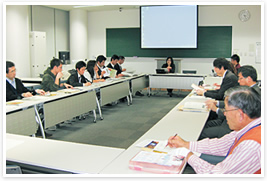
Tourism Management Human Resources Development Seminar “Let’s Expand the Hospitality of Iwate”
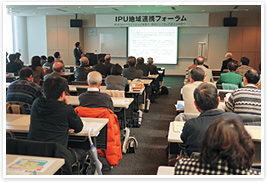
IPU Regional Collaboration Forum “Constructing Partnerships with the Region ~ Toward the Establishment of a Prefectural Citizen Think-Tank”
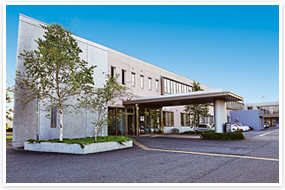
Regional Collaboration Building (i-MOS, Regional Policy Research Center)
The Iwate Monodukuri and Software Integration Technology Center (i-MOS) came to life in April 2011. By integrating the university's software research with Iwate's renowned manufacturing technologies such as embedded software, the Center aims to create a new innovation industry and become an industrial hub.
i-MOS strives to drive forward research centered around robotics technology and the Next-Generation Intelligent Information Technology of the automobile industry, train high-level manufacturing engineers, support prototype development, and so on. It aims for the comprehensive revitalization of industry in Iwate Prefecture while also functioning as a liaison for industry-university matching and the securing of research funds.
A variety of equipment was brought into the facility to make next-generation intelligent information technology development possible. In addition to a Human Engineering Lab equipped with a research driving simulator for road construction and automotive product development, as well as a 3D Lab with a large display to handle the visualization of large-scale simulation calculations and calculation results, the facility also has an embedded systems experiment and training room.
Technological development and the promotion of joint research with businesses within the prefecture are expected in the future in order to create new industry within Iwate Prefecture. (please click here for research theme information)
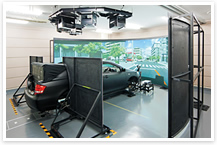
Real-Time Driving Simulator equipment installed in the i-MOS Human Engineering Lab
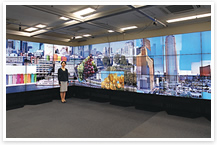
i-MOS 3D Lab, a Large High-Definition Visualization System composed of 27 displays
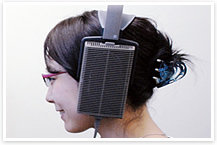
Analysis of a automobile in motion is possible in the lab with the simulator
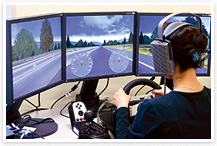
The driving noise sensory test equipment of the i-MOS Human Engineering Lab
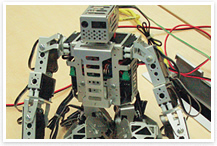
A high-level engineer training seminar using an autonomous biped robot was also held
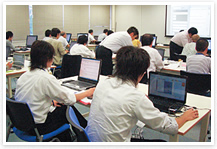
High-level engineer training seminar held by i-MOS
In April 2011, the Regional Policy Research Center was established for research and local contributions that bring vitality to Iwate. It bears the role of being a think-tank that tackles local issues that burden the citizens of the prefecture by strengthening collaborations between industries, various groups, and government offices.
Local issues within the prefecture are sampled, and support is provided through various researches and projects at the university, from the viewpoints of “medical treatment and welfare,” “industry, economy, and employment,” “raising children and youth,” “environment and natural resources,” “safety and peace of mind,” “regional society and community,” and “ICT utilization”. In parallel with the strengthening of collaborations with the local community, themed empirical research is carried out and suggestions are made on policymaking, etc. Also, by dispatching lecturers and holding symposiums afterwards, the research findings are returned to the local community.
After the Great East Japan Earthquake and Tsunami in March 2011, the "Earthquake Disaster Reconstruction Research Division" was established in the center. In 2011, research was started for a total of 15 issues over three fields: community building and dietary habit improvement in the lifestyle field, exploring directions for industrial recovery based on regional characteristics in the industry and economy field, and working to create a disaster-resistant community through the improvement of temporary housing and disaster prevention education in the social infrastructure field.
Long-term support activities for disaster-stricken areas are being undertaken with the cooperation of the local government and residents. (please click here for selected theme information)
Starting immediately after the Great East Japan Earthquake and Tsunami of March 11, 2011, the university opened its facilities, accepted students, gathered information, and so on. Furthermore, the President of the university, Yoshihisa Nakamura, visited all 11 coastal municipalities in the area affected by the tsunami, explained the support system of the university, and expressed that the university would work together with the affected cities, towns and villages towards reconstruction. Support has been continued thereafter as well based on the demands of the disaster-stricken areas, by fully utilizing the specialties of each faculty member and so on.
On April 5, the Disaster Reconstruction Support Center was established as a general point of contact for the volunteer activities of the teaching staff and students, as well as the deployment of teaching staff to best make use of their specialties. In collaboration with the Student Volunteer Center, other related institutions, and various university departments, there is also a support volunteer bus that makes regular trips to the disaster-stricken areas. From this point forward as well, we will strive as a university in the disaster-stricken prefecture to provide long-term support by utilizing intellectual property and human resources.
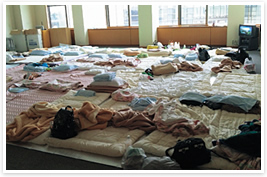
After the earthquake occurred, the university was opened to students and bedding was laid out in conference rooms
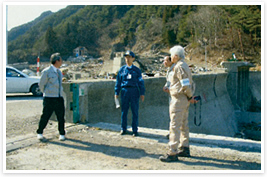
University President Yoshihisa Nakamura visiting a disaster-stricken area. All 11 coastal municipalities were visited.
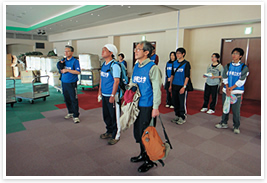
Volunteers of the second volunteer bus on July 23. The university chairman also participated.
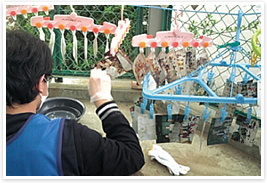
Student volunteer cleaning in Otsuchi Town in May




